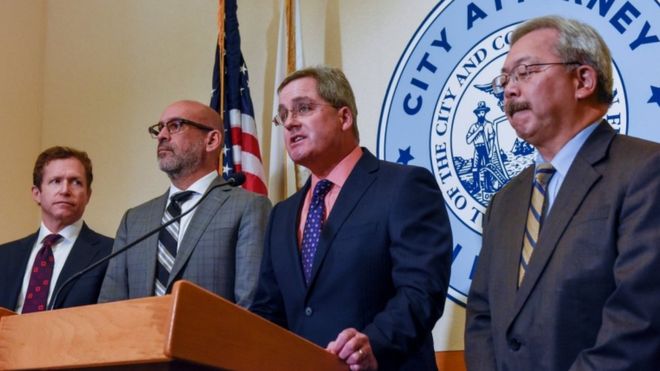US District Judge William Orrick Tuesday morning made a verdict that will see President Trump’s executive order stall in the US. The order, which was issued on January 25th by Mr. Trump, barred ‘sanctuary cities’ such as New York, Los Angeles and Chicago from accessing federal funds because they did not ‘conform to the federal immigration laws.’
Sanctuary cities, the Department of Homeland Security states, are those that harbor illegal immigrants from the authorities. Similarly, cities whose local law enforcement did not act on evicting immigrants and forwarding them to the immigration department are considered sanctuary dwellings.
‘The order could be unconstitutional.’
Judge Orrick made his ruling on Tuesday in favor of the plaintiffs which were the San Francisco and Santa Clara Counties. The counties were denied $1.2 and $1.7 billion in federal funding when the order was issued. The high court justice cited the reason for his decision as the legitimacy of the counties’ suit. The counties, he pointed out, could prove that the order violated their constitutional rights to funding, therefore, the order could be considered extrajudicial.
Furthermore, Orrick stated, counties could not suffer just because the president did not agree with their implementation strategies for the immigration act. Orrick said that the phrasing in the order itself hinted that Mr. Trump wanted to use it as ‘a weapon against those he disagreed with.’ The categories of the policy were not restricted to law enforcement alone, and that was concerning.
The White House responded to the ruling by calling it ‘bananas’ in a statement issued on Tuesday. The White House Chief of Staff insisted that the president would take action against the judgment it by appeal. Should it follow through with the threat, the appeal would be the third in a line of calls the administration has filed. The other two were from cases where courts in two different states had ruled against President Trump’s executive order which restricted travel of people from Islamic majority nations.
One of the reasons cited for the verdict in Tuesday’s case was that federal funding and immigration enforcement by law enforcement are completely non-dependent. This reason is legitimate but does not protect states from losing out on federal grants, Orrick explained. Some federal grants have particular prerequisites that make any ‘sanctuary city’ liable for loss of funding. Orrick’s declaration was augmented when nine cities failed to receive state-funded grants because they did not implement immigration law strategies to the recommended extent. As such, the US Justice Department urged these cities to comply with any federal laws regarding sanctuary jurisdictions.
The current administration laid down the argument that the failure by police forces in the country to detain illegal residents endangered public safety. Those against the policy refuted that statement by saying that the enforcement of the policy by the local authorities would breed mistrust between the police and communities such as the Latinos.
The High Court ruling came just before arguments arose between various parties over the proposed building of the US-Mexico wall.




